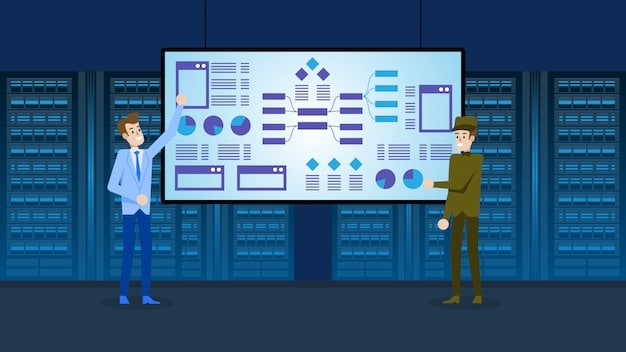Upskilling in 2025: 5 Tech Skills for 20% Salary Increase

Upskilling in 2025 by acquiring specific high-demand tech skills—such as advanced AI/ML, cybersecurity, cloud architecture, DevOps, and blockchain—offers professionals a tangible pathway to significantly increase their earning potential, with projections indicating a possible 20% salary increase due to market demand and specialized expertise.
The landscape of work is shifting, and for those in the tech sector, adaptability is no longer a suggestion but a necessity. The year 2025 is poised to bring forth new challenges and, more importantly, unprecedented opportunities for professionals willing to invest in their skill sets. This piece delves into how upskilling in 2025: 5 high-demand tech skills that guarantee a 20% salary increase could be your strategic move. Is your current career trajectory set for significant advancement without a targeted upgrade in expertise? This exploration is designed to help you navigate those crucial decisions.
The Urgency of Upskilling in a Dynamic Tech Landscape
The rapid evolution of technology is not merely a trend; it’s a foundational shift reshaping industries and job markets globally. In 2025, professionals unwilling or unable to adapt to these changes may find their skills quickly becoming obsolete. The concept of upskilling, or acquiring new skills to improve job performance or prepare for future roles, has become paramount. It’s not just about staying relevant; it’s about pioneering the future of your career. This proactive approach ensures that you remain competitive and, crucially, valuable in an increasingly specialized marketplace.
This shift is driven by several factors, including the acceleration of digital transformation across sectors, the pervasive integration of AI and automation, and an increased global interconnectedness that demands sophisticated technical capabilities. The demand for specialized expertise now far outstrips the supply of talent, creating a lucrative environment for those who possess the most sought-after skills. Organizations are actively seeking individuals who can not only manage current technologies but also anticipate and implement future solutions. This urgency translates directly into compensation increases for those with the right skills.
Understanding the Market Demand
The market signals for specific tech skills are clear. Reports from leading industry analysts consistently point to a growing deficit in areas like artificial intelligence, cybersecurity, and cloud computing. This gap between available talent and required expertise creates a premium for skilled professionals, often manifesting as substantial salary bumps. Employers are eager to invest in talent that can drive innovation, secure critical assets, and optimize complex infrastructures.
The Value Proposition of New Skills
Acquiring new, high-demand skills isn’t just about personal growth; it’s a tangible investment with a direct return. For many tech professionals, the commitment to learning new competencies directly correlates with a significant increase in earning potential. This value proposition is particularly compelling in a sector where continuous learning is intertwined with career longevity and advancement. The ability to tackle complex, novel problems with specialized knowledge is an asset that employers are willing to pay for.
The dynamic nature of technology means that what is cutting-edge today might be standard practice tomorrow. Therefore, constant learning and adaptation are key to maintaining a competitive edge. This section emphasizes the critical importance of being proactive rather than reactive in your career development. The investment in upskilling now can secure a financially rewarding and fulfilling future within the tech industry.
Skill 1: Advanced AI and Machine Learning Expertise
Artificial Intelligence (AI) and Machine Learning (ML) are not just buzzwords; they are transformative technologies reshaping every industry, from healthcare to finance, retail, and manufacturing. As we approach 2025, the demand for professionals with advanced AI and ML expertise is set to explode, driven by the increasing need for intelligent automation, predictive analytics, and sophisticated data interpretation. Mastering this domain means not just understanding algorithms but being able to apply them to real-world business problems, innovate new solutions, and drive strategic decision-making.
This field extends beyond basic data science into areas like deep learning, natural language processing (NLP), computer vision, and reinforcement learning. Companies are looking for individuals who can build, deploy, and manage complex AI models, ensuring they are ethical, secure, and scalable. The ability to translate business requirements into technical specifications for AI/ML projects and to interpret the results for non-technical stakeholders is also paramount. This blend of technical prowess and business acumen makes AI/ML experts incredibly valuable.
Deep Learning and Neural Networks
Deep learning, a subset of machine learning, involves neural networks with many layers, allowing them to learn from vast amounts of data. Experts in this area are at the forefront of developing groundbreaking applications.
- Designing and optimizing complex neural network architectures.
- Implementing advanced deep learning frameworks like TensorFlow or PyTorch.
- Solving intricate problems in areas such as image and speech recognition.
Natural Language Processing (NLP)
NLP focuses on enabling computers to understand, interpret, and generate human language. As businesses increasingly rely on textual data, NLP specialists are in high demand. Their skills are critical for developing intelligent chatbots, sentiment analysis tools, and advanced search engines.
The true value of an AI/ML expert lies in their capacity to innovate and apply these technologies to create tangible business impact. This could involve optimizing supply chains with predictive models, enhancing customer experiences through personalized recommendations, or automating complex tasks to improve efficiency. The demand for these skills is pushing salaries upward, often beyond the 20% mark for those with proven experience and a strong portfolio.
Skill 2: Cybersecurity and Data Privacy Proficiency
In an increasingly interconnected world, where data breaches and cyber-attacks are daily occurrences, cybersecurity and data privacy proficiency have become non-negotiable for organizations of all sizes. The proliferation of cloud computing, IoT devices, and remote work models has expanded the attack surface, creating an urgent need for skilled professionals who can protect sensitive information and critical infrastructure. For 2025, mastering this domain means understanding not just technical vulnerabilities but also regulatory compliance (like GDPR and CCPA), risk management, and incident response.
This field is complex and constantly evolving, requiring professionals to stay abreast of the latest threats, technologies, and best practices. From ethical hacking and penetration testing to security architecture design and forensic analysis, the roles within cybersecurity are diverse and highly specialized. Companies are willing to pay a premium for individuals who can ensure the integrity, confidentiality, and availability of their digital assets, thereby mitigating financial losses and reputational damage.
Threat Intelligence and Incident Response
Understanding emerging cyber threats and developing robust response plans is critical for minimizing the impact of security incidents. Professionals in this area gather, analyze, and disseminate threat intelligence to proactively defend against attacks.
- Developing and implementing incident response protocols.
- Performing forensics and root cause analysis of security breaches.
- Crafting strategies to mitigate future risks based on threat intelligence.
Cloud Security and Compliance
With more businesses migrating to cloud platforms, securing these environments is paramount. Cloud security specialists design and implement security measures within cloud infrastructures, ensuring compliance with relevant data protection regulations. Their expertise often covers aspects unique to cloud environments, such as shared responsibility models and identity and access management (IAM) in the cloud.
The salary projections in cybersecurity reflect the acute shortage of talent and the critical nature of the work. For those with advanced certifications (e.g., CISSP, CISM, CEH) and practical experience, a 20% salary increase is not just possible but highly probable, given the escalating demand for robust digital protection mechanisms across industries. The ability to preempt and neutralize cyber threats makes these professionals indispensable.
Skill 3: Cloud Architecture and Management
Cloud computing has moved beyond being an emerging technology to become the bedrock of modern IT infrastructure. As businesses continue their migration to cloud-native environments and leverage multi-cloud strategies, the demand for skilled cloud architects and managers is burgeoning. For 2025, proficiency in this area signifies more than just familiarity with AWS, Azure, or Google Cloud; it encompasses the ability to design, implement, and manage scalable, secure, and cost-effective cloud solutions that align with business objectives.
Cloud architects are instrumental in strategizing digital transformation, optimizing resource utilization, and ensuring robust performance across diverse cloud platforms. Their expertise is crucial for businesses aiming to harness the agility and innovation that cloud ecosystems offer. These professionals often possess a deep understanding of infrastructure as code (IaC), serverless computing, containerization (Docker, Kubernetes), and hybrid cloud deployments.
Multi-Cloud Strategy and Integration
Many organizations are adopting multi-cloud strategies to avoid vendor lock-in and leverage the best features of different providers. Expertise in integrating and managing workloads across multiple cloud environments is highly valued.
- Designing unified cloud management platforms.
- Implementing seamless data migration strategies between clouds.
- Ensuring consistent security and compliance across diverse cloud setups.
Cost Optimization and Performance Tuning
Efficient cloud management involves not only deploying services but also optimizing their performance and controlling expenditure. Cloud professionals who can balance these two critical aspects are highly sought after. They implement strategies for cost savings, resource scaling, and performance monitoring to ensure cloud resources deliver maximum value.
The transition to cloud-centric operations means that companies are heavily reliant on experts who can navigate these complex ecosystems. Given the ongoing investment in cloud technologies, professionals with advanced cloud architecture and management skills are seeing significant salary increases, often exceeding the 20% mark, due to their direct impact on operational efficiency and competitive advantage. Their ability to craft resilient and high-performing cloud infrastructures makes them indispensable assets.

Skill 4: DevOps and Site Reliability Engineering (SRE)
The synergy between development and operations, commonly known as DevOps, has revolutionized software delivery by promoting collaboration, automation, and continuous feedback. In 2025, the demand for DevOps engineers and Site Reliability Engineers (SREs) will remain exceptionally high. These professionals are the linchpins of efficient and reliable software deployment, bridging the gap between development teams who build applications and operations teams who ensure their stable running. Their role is critical for accelerating product releases, maintaining system uptime, and enhancing overall software quality.
SRE, often considered a specialized evolution of DevOps, focuses on applying software engineering principles to operations tasks to ensure the reliability and scalability of systems. SREs are responsible for shared ownership of production, incorporating automation, monitoring, and proactive problem-solving to improve system performance and resilience. Together, DevOps and SRE ensure that software is delivered quickly, reliably, and with minimal errors, which is paramount for competitive businesses.
Automation and CI/CD Pipelines
Central to DevOps and SRE is the automation of the software delivery pipeline, from code commit to deployment. Expertise in continuous integration (CI) and continuous delivery (CD) tools and methodologies is non-negotiable.
- Building and maintaining automated CI/CD pipelines.
- Implementing tools for configuration management and infrastructure automation.
- Streamlining deployment processes to reduce manual effort and errors.
Monitoring and Observability
To ensure system reliability, DevOps and SRE professionals must implement robust monitoring and observability solutions. This involves collecting and analyzing metrics, logs, and traces to gain insights into system behavior and performance. Proactive identification and resolution of issues prevent outages and optimize user experience.
The growing complexity of modern software systems makes DevOps and SRE more crucial than ever. Professionals in this field often command high salaries because their work directly impacts the speed of innovation, operational stability, and customer satisfaction. The efficiency and reliability they bring to the development and deployment process can lead to substantial business advantages, justifying salary increases well above 20% for top talent.
Skill 5: Blockchain and Distributed Ledger Technology
Blockchain, often associated primarily with cryptocurrencies, is a foundational technology with far-reaching implications across numerous industries beyond finance. Distributed Ledger Technology (DLT) offers unparalleled security, transparency, and immutability for recording transactions and managing data. As we move into 2025, businesses are increasingly exploring how blockchain can optimize supply chains, secure digital identities, enhance data sharing, and create new forms of digital assets. Professionals with expertise in blockchain development and strategy are thus becoming highly sought-after.
This skill set goes beyond simply understanding how blockchain works. It involves the ability to design, develop, and deploy smart contracts, build decentralized applications (dApps), and understand the intricacies of various blockchain platforms (Ethereum, Hyperledger, Corda, Solana). Furthermore, it includes expertise in cryptography, consensus mechanisms, and the regulatory landscape surrounding DLT. The transformative potential of blockchain makes it a critical area for innovation and efficiency across various sectors.
Smart Contract Development and Audit
Smart contracts are self-executing contracts with the terms of the agreement directly written into code. Expertise in developing and auditing these contracts, often using languages like Solidity, is crucial for building secure and reliable blockchain solutions.
- Writing secure and efficient smart contracts for various use cases.
- Conducting security audits and vulnerability assessments of smart contracts.
- Integrating smart contracts with existing business processes.
Decentralized Finance (DeFi) and NFTs
Beyond traditional blockchain applications, the burgeoning fields of Decentralized Finance (DeFi) and Non-Fungible Tokens (NFTs) present significant opportunities. Professionals who understand the underlying technology and economic models of DeFi protocols and NFT marketplaces are at the cutting edge of digital innovation. Their skills are critical for navigating this rapidly evolving ecosystem.
The nascent but rapidly expanding nature of the blockchain industry means that skilled professionals are in high demand, but short supply. This scarcity drives up compensation, making a 20% salary increase a realistic expectation for those who can demonstrate practical experience in building and deploying blockchain solutions. The ability to leverage DLT for unprecedented levels of trust and efficiency positions these experts at the forefront of digital transformation.

Strategizing Your Upskilling Journey for 2025
Embarking on an upskilling journey requires a strategic approach. It’s not enough to simply pick a skill; one must align it with personal career goals, market demand, and available resources. For 2025, the emphasis is on targeted learning that delivers tangible returns. This section outlines key considerations and practical steps to ensure your upskilling efforts are both effective and rewarding, leading to that elusive 20% salary increase.
Careful planning can distinguish a successful upskilling initiative from one that merely accumulates knowledge without clear application. Consider your current role, your desired future trajectory, and how a specific skill can bridge that gap. The most impactful upskilling often involves a blend of formal education, practical application, and continuous networking within the chosen domain. This holistic approach builds not only knowledge but also experience and visibility, crucial elements for career advancement.
Choosing the Right Learning Path
There are numerous avenues for acquiring new skills, each with its advantages. From online courses and certifications to bootcamps and advanced degrees, the choice depends on your learning style, time commitment, and financial resources.
- Online Platforms: Coursera, edX, Udemy, and Udacity offer flexible learning options.
- Bootcamps: Intensive, short-term programs for rapid skill acquisition.
- Certifications: Industry-recognized credentials that validate expertise.
Practical Application and Portfolio Building
Theoretical knowledge is important, but practical experience is what truly sets professionals apart. Actively applying your new skills through personal projects, open-source contributions, or volunteer work builds a tangible portfolio. This portfolio serves as concrete evidence of your capabilities and is invaluable during job negotiations. Showcasing what you can actually do, rather than just what you know, significantly enhances your market value.
Beyond technical proficiency, consider developing complementary “soft” skills such as problem-solving, critical thinking, communication, and adaptability. These abilities amplify the impact of your technical expertise and are highly valued by employers. By strategically choosing your upskilling path and committing to practical application, you can significantly enhance your career prospects and achieve your desired salary growth in 2025. This comprehensive approach ensures that your investment in learning translates into a real and measurable boost to your professional standing and income.
Maximizing Your Salary Increase Potential
Achieving a significant salary increase, particularly the 20% target mentioned, requires more than just acquiring new skills; it demands strategic negotiation, market awareness, and a clear demonstration of value. In 2025, with specific high-demand tech skills, you are in a stronger position than ever before to leverage your expertise for better compensation. Understanding how to articulate your value and present your enhanced capabilities is key to maximizing your earning potential.
It’s crucial to research market rates for your newly acquired skills in your region and industry. This knowledge empowers you during salary discussions, enabling you to present well-informed arguments for your worth. A clear understanding of the demand-supply dynamics for your niche skills further strengthens your position. Remember, a salary is not just about your past performance but also your future potential and the solutions you can bring to an organization’s challenges.
Negotiating Your Worth
Salary negotiation is a skill in itself. Armed with your new high-demand tech skills, approach negotiations with confidence, highlighting how your enhanced capabilities directly address an organization’s needs and contribute to its strategic goals.
- Quantify your impact: Translate your skills into tangible benefits, such as increased efficiency, reduced costs, or new revenue streams.
- Market benchmark: Provide data-driven insights on what professionals with your new skill set are earning.
- Be prepared to walk away: Knowing your worth and being willing to decline offers that don’t meet your expectations can strengthen your bargaining position.
Continuous Professional Development
The tech landscape is ever-evolving, so maintaining your competitive edge requires a commitment to lifelong learning. Regularly updating your skills, keeping abreast of industry trends, and seeking out new challenges will ensure you remain highly valuable. This ongoing development not only sustains your high earning potential but also opens doors to leadership roles and more complex projects.
Ultimately, maximizing your salary increase potential in 2025 is about strategically positioning yourself as an indispensable asset. With advanced skills in areas like AI, cybersecurity, cloud architecture, DevOps, or blockchain, you are not just a skilled employee but a critical driver of innovation and efficiency. By effectively communicating this value and proactively managing your career trajectory, achieving a 20% salary increase becomes a realistic and attainable goal. The investment in your skills today is the foundation of your financial growth tomorrow.
| Key Skill | Brief Description |
|---|---|
| 🤖 Advanced AI/ML | Expertise in deep learning, NLP, and applying AI for business solutions. |
| 🔒 Cybersecurity | Proficiency in threat intelligence, cloud security, and data privacy. |
| ☁️ Cloud Architecture | Designing and managing scalable, secure multi-cloud environments. |
| 🔗 Blockchain/DLT | Developing smart contracts and understanding DeFi/NFTs for enterprise use. |
Frequently Asked Questions About Upskilling in Tech
Upskilling refers to the process of learning new skills to improve your current job performance or prepare for a different role. It is crucial now due to rapid technological advancements, especially in tech, which render existing skill sets obsolete if not updated, impacting job security and career growth. It ensures professionals remain competitive and highly valuable.
Yes, acquiring high-demand tech skills like advanced AI, cybersecurity, or cloud architecture can genuinely lead to a 20% or even higher salary increase. This occurs because the demand for these specialized skills often outstrips supply, positioning skilled professionals as highly valuable assets. Salary jumps reflect the immediate impact these skills can have on business efficiency and innovation.
The time required varies significantly depending on the skill, your foundational knowledge, and the learning method. Some intensive bootcamps can deliver proficiency in 3-6 months, while mastering complex areas like advanced AI/ML or cloud architecture might take 1-2 years of dedicated study and practical application through formal courses or self-learning paths.
Yes, numerous free resources exist. Platforms like YouTube, freeCodeCamp, MIT OpenCourseware, and various university open courses offer foundational knowledge. Cloud providers (AWS, Azure, Google Cloud) also provide free introductory courses and labs. While these are great starting points, often paid certifications or specialized programs are needed for advanced expertise.
Beyond technical skills, “soft” skills are incredibly valuable. These include critical thinking, problem-solving, effective communication, adaptability, and leadership qualities. Networking, building a strong professional portfolio, and strategic job negotiation are also crucial elements that significantly contribute to career advancement and maximizing salary potential in the competitive tech landscape.
Conclusion
The trajectory of the tech industry into 2025 clearly signals that continuous learning and strategic upskilling are not merely advantageous but imperative for sustained career growth and significant financial reward. As technologies like advanced AI and machine learning, robust cybersecurity measures, scalable cloud architecture, efficient DevOps practices, and transformative blockchain applications embed themselves deeper into global economies, the professionals who master these domains will find themselves at a substantial competitive advantage. The promise of a 20% salary increase for acquiring these high-demand skills is a tangible reflection of the acute market need for specialized expertise. By proactively investing in these critical areas, tech professionals can not only future-proof their careers but also unlock unprecedented earning potential, moving from reacting to technological shifts to actively shaping the future of innovation.





